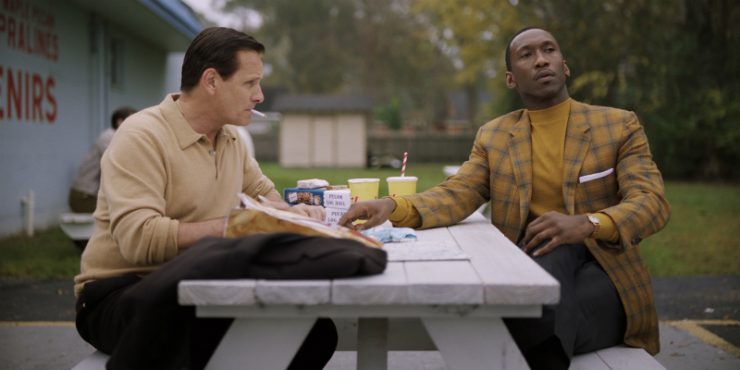What does one make of Green Book? The film has won major prizes from the National Board of Review and at the Toronto Film Festival, but feels like a certified crowd-pleaser straight out of 1967. In that year, right at the moment when the bloated studio system was giving way to the more daring New Hollywood, American film could make a film like Green Book and congratulate itself for addressing America’s long, tumultuous history with race. Liberal filmmakers like Norman Jewison and Stanley Kramer addressed racism as a two-sided issue, a dilemma with villains on both sides, the ultimate culprit being a lack of civility on either end. It says a lot that Green Book takes plot points from both Kramer’s Guess Who’s Coming to Dinner? and Jewison’s In The Heat of the Night, with a heavy dose of Driving Miss Daisy.
Inexplicably directed by Peter Farrelly – a director usually known for partnering with his brother, Bobby, and making sleaze-ball comedies like Dumb and Dumber and There’s Something About Mary – Green Book argues for communion despite segregation, for the folksy wisdom of the prejudiced common man. That it’s actually quite a funny comedy seems besides the point. If Peter Farrelly knows anything, it’s what makes people laugh, but the funny things in Green Book are polished recycling of centuries-old conservative philosophy, and I can’t be the only person unsettled by the things that tickled my audience the most. The film stars Viggo Mortenson as Tony “Lipp” Vallelonga and Mahershala Ali as Dr. Don Shirley, and the movie makes easy work of contrasting Tony’s Italian-American vulgarity with Shirley’s austere black elitism.
Don Shirley is a renowned classical pianist living above Carnegie Hall who has played for President Kennedy in the White House and commands great respect. Tony Lipp is a bouncer at the Copacabana, born and raised in the Bronx, living with his wife Delores (Linda Cardellini) in the same neighborhood he grew up in. When Shirley and his trio take a tour through the Deep South, he hires Tony to be his driver, less for his driving skills and more for his tough reputation. Shirley understands the variety of issues he will confront in the Bible Belt, and Tony’s notorious fists could end up being a vital resource. Right away, Tony’s careless personality and crass language rubs uncomfortably against Shirley’s uptight discipline. Like most odd couple comedies, it takes a while for these men to respect each other.
But respect each other they do as Shirley helps Tony improve his elementary diction and Tony teaches Shirley the virtues of Chubby Checker and fried chicken. Along the way, they meet rough customers in Georgia, North Carolina and Alabama. On more than one occasion, Shirley is beaten, and on more than one occasion Tony is made to put himself between Shirley and direct bigotry. It’s hard to tell how much Tony learns about racism on his trip, as he greets everything with a worldly, seen-it-all-before shrug. It’s Shirley that Green Book targets more often; his sharp clothes and judgmental attitude singled out as out of touch. Tony views Shirley as someone who found a ticket out of the poverty most blacks are saddled with, and took nobody along with him.
I can’t really fault Green Book for being a movie that hopes to make the audience feel good, but I question its methods. There’s lots to say about Mortenson in this movie: he’s funny and charismatic, but the performance feels completely antithetical to his entire body of work, which is made of wonderfully nuanced and complex performances. Tony Lipp is a one-note character, even if Mortenson plays that one note incredibly well. As Shirley, Ali does his best to project dignity in the Sydney Poitier role (the black man who gains perspective by learning to understand the racist white man), and he also gets to show off a gift at the piano, but the role is mostly thankless. This is a movie meant to make the white audience members feel good and thus, Mortenson is given the much superior part.
Even while gaining accolades from festivals and critics groups, Green Book has already been declared a flop for its disappointing box office turn. I couldn’t say what this reflects: either a disinterest in the liberal social politics or the more general disregard for mid-budget studio dramas. Films like this, which are made to appeal to “everyday people”, need to actually be seen by people to really gain steam. There’s so much wrong here. Even its conclusion, filled with sugary sentimentality, falls short of addressing the actual racism that was in Tony’s heart (the film’s first act includes a scene where he throws out drinking glasses after two black men have used them), and that lack of reconciliation proves what Green Book is really interested in. It believes in the harmony of the movies, not equality.
Directed by Peter Farrelly










